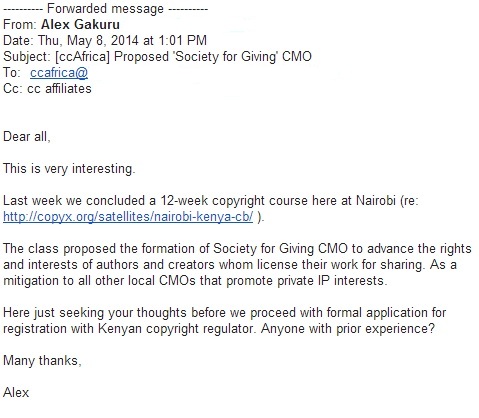New Cases for Copyright Collective Management in Kenya: Software and Some Rights Reserved
- Victor Nzomo |
- June 25, 2014 |
- CIPIT Insights

The collective management of copyright within Africa has emerged as one of the most viable means of bridging the gap between copyright owners and users of copyright works. According to the African Regional Committee of the International Confederation of Societies of Authors and Composers (CISAC), the royalty collections by African collective management organizations (CMOs) totaled over 55 Million Euros, a 25% increase from the year 2012-2013. However the bulk of these royalties relate to the music-related and audio-visual sectors.
In the recent past, there have been suggestions that Kenya should consider encouraging and/or allowing the formation of a CMO that will administer rights on behalf of owners of software and a CMO that will administer the rights of owners whose works are licensed under a “some rights reserved” framework.
This blogpost looks at the current framework for licensing of CMOs in Kenya and the likelihood of registration of these two proposed CMOs. Section 3 of the Copyright Act establishes the Kenya Copyright Board (KECOBO), a state corporation whose mandate is the overall administration and enforcement of copyright and related rights in Kenya. KECOBO is specifically mandated under Section 5(b) of the Act to license and supervise the activities of CMOs as provided for under the Act. Part V of the Act specifically addresses collective administration of copyright. For a body to be licensed as a CMO by KECOBO it must meet all the requirements set out in the Act.
Presently, KECOBO has registered and licensed four CMOs with respect to the administration of rights in musical works, literary works, audio-visual works and sound recordings.
With respect to the proposed CMOs, an important question to be asked is whether the class of rights and category of work in question is already administered through an existing CMO. If so, then KECOBO will not approve another CMO unless it is established that the existing licensed CMO is not functioning “to the satisfaction of its members”.
It is important to note that KECOBO enjoys a discretionary power to “assist in establishing a CMO for any class of copyright owners where it finds it expedient”. This power could be exercised in favour of any proposed CMO.
1. Proposed ‘Society for Giving’ CMO
Alex Gakuru, Creative Commons Regional Coordinator for Africa, makes the proposal for “the formation of Society for Giving CMO to advance the rights and interests of authors and creators whom license their work for sharing. As a mitigation to all other local CMOs that promote private IP interests.”

The challenge for this proposed CMO is that there already exists CMOs that represent authors and creators of musical and literary works, namely MCSK and KOPIKEN respectively. However there are no CMOs administering rights in audio-visual and artistic works.
2. Software CMO:

Isaac Rutenberg, CIPIT Director, in a blogpost titled “Why aren’t there CMOs for software?”, makes a compelling case for the collective management of software. According to Rutenberg:
“Computer source code is subject to copyright, so programmers constitute a class of “copyright owners (… )Some software developer companies (particularly those making mobile phone apps) have literally hundreds of independent pieces of software on offer, much like some musicians have vast repertoires of music. Furthermore, cloud computing is already changing the standard model of software distribution, by allowing users to access programs and data stored on remote servers (rather than being stored locally) (….) Perhaps a pizza or chicken restaurant would benefit from having access to thousands of video games sourced from hundreds of developers, all of which is licensed for a set fee from a CMO. Or perhaps individuals could buy a license from a CMO to gain access to thousands of apps for their mobile phone. Or perhaps businesses could buy a license from a CMO and gain access to hundreds of types of business software from different providers.”
While it is conceded that collectivism, generally speaking, may be beneficial to software owners, the collective management system does not seem to be particularly attractive among the industry players. An important prerequisite for the establishment of CMOs in any industry is a concerted push from the copyright owners themselves. The absence of this push from the rights holders is perhaps a clear indication that software owners have no intention or desire to assign their rights to a CMO.
Be it as it may, would it be possible to have two CMOs dealing with literary works namely KOPIKEN for works in the printed form and another CMO for works in the digital form?
